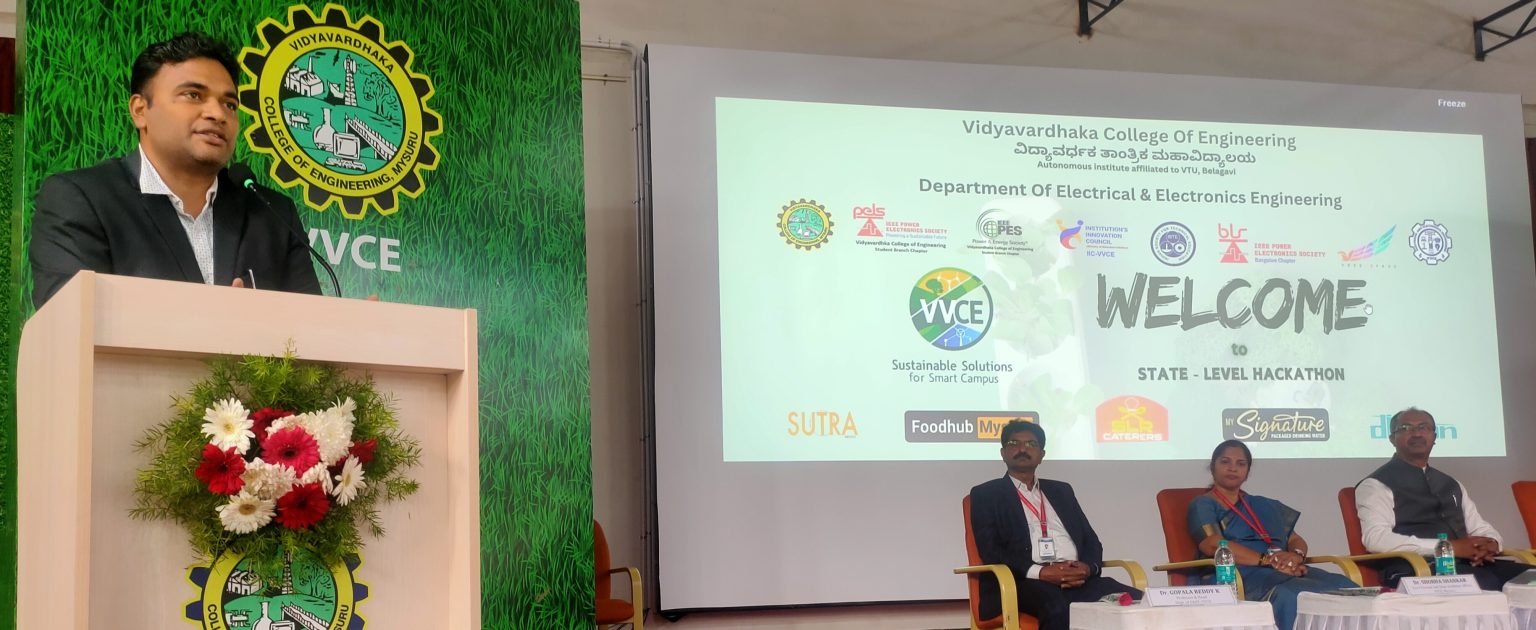
Mysuru: Sustainable solutions are becoming essential to creating innovative changes in urban infrastructure.
Deepak A E, Executive Engineer of Mysuru City Corporation (MCC), highlighted the significant benefits of adopting sustainability in Mysuru City Corporation operations, emphasising that such measures have led to substantial cost savings.
Addressing participants at a state-level hackathon on Sustainable Solutions for Smart Campus, organised by the Department of Electrical and Electronics Engineering , Vidyavardhaka College of Engineering (VVCE), Deepak shared the city’s achievements.
He explained that by switching from conventional street lighting to energy-efficient LED lights, the corporation has managed to cut its electrical bill by over 50%.
“Previously, we were spending Rs 50 crore on electricity; today, that figure has been reduced to Rs 25 crore,” said Deepak, showcasing the potential for sustainable solutions to drive significant cost savings.
He further stressed that the same innovative approach can be applied to other municipal services like sewage treatment plants (STPs) and water management systems, which could yield similar savings and improve services to citizens.
“If we extend these practices to other departments, we can not only save money but also enhance service delivery to the people,” he added.
Deepak encouraged participants to explore the wide array of potential projects within the Mysuru City Corporation and contribute sustainable solutions to address various challenges the city faces.
The hackathon, which attracted bright minds from across the state, was also addressed by B Sadashivegowda, Principal of VVCE.
In his speech, he emphasised the importance of hackathons as a tool for rapid learning and innovation.
“Hackathons have become a regular feature at our institute. We organize them frequently because we believe it’s one of the fastest ways to learn,” said Sadashivegowda. He explained that hackathons provide students with real-world problems to solve in a limited time frame, often pushing them out of their comfort zones and encouraging new approaches to problem-solving.
Sadashivegowda added, “While winning a prize is not the ultimate goal, the key is to participate actively and learn as much as possible. It’s not about the result, but about the process of learning through both success and failure.” He encouraged students to draw inspiration from others’ experiences, as this process could help them grow into innovative and exceptional problem-solvers.
In conclusion, both Deepak and Sadashivegowda highlighted the importance of sustainability and innovation in shaping a brighter future for Mysuru, urging students and professionals to actively engage in exploring sustainable solutions to the city’s challenges. Through initiatives like this hackathon, they aim to nurture a culture of learning, innovation, and problem-solving that will ultimately lead to a smarter, more sustainable urban lalandscape.
The hackathon also aimed to encourage students to design and develop innovative solutions that promote sustainability in smart campus environments. Participants worked intensively on projects that focused on sustainable development, energy efficiency, and environmental conservation, with the opportunity to win exciting cash prizes. This hackathon provided a unique platform for students to collaborate, innovate, and showcase their ideas for a more sustainable future, aligned with the growing demand for smart and green technologies in urban spaces.
Shreeshaila Ramannavar, Treasurer, Gopal Reddy, Professors Savyasachi G K, Avinash R, Karthik R P and Bhushit M K, were also present.
TrendForce 2024 Global LED Lighting Market Analysis
Release Date: 01 February 2024 / 31 July 2024
Language: Traditional Chinese / English
Format: PDF and Excel
Page: 90-100 / Semi-Annual
|
If you would like to know more details , please contact:
|












